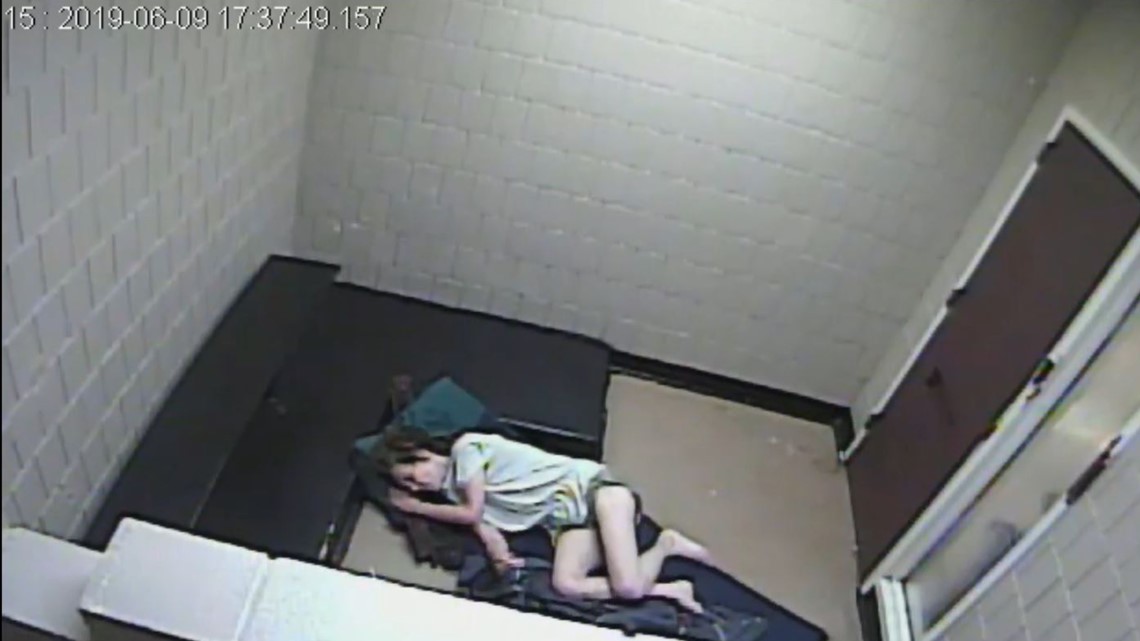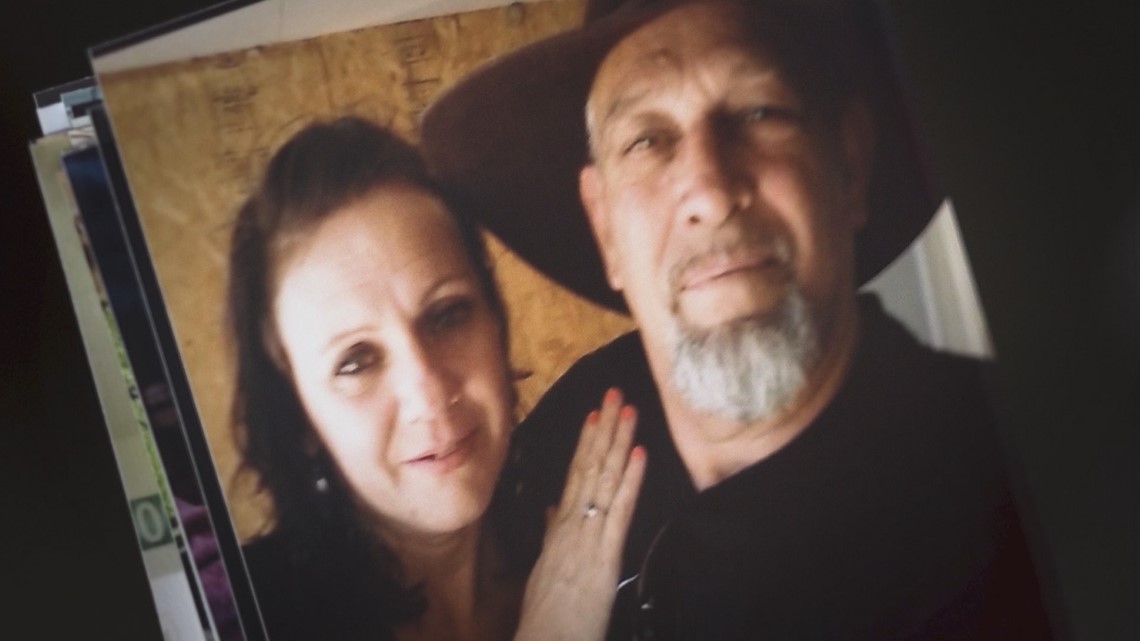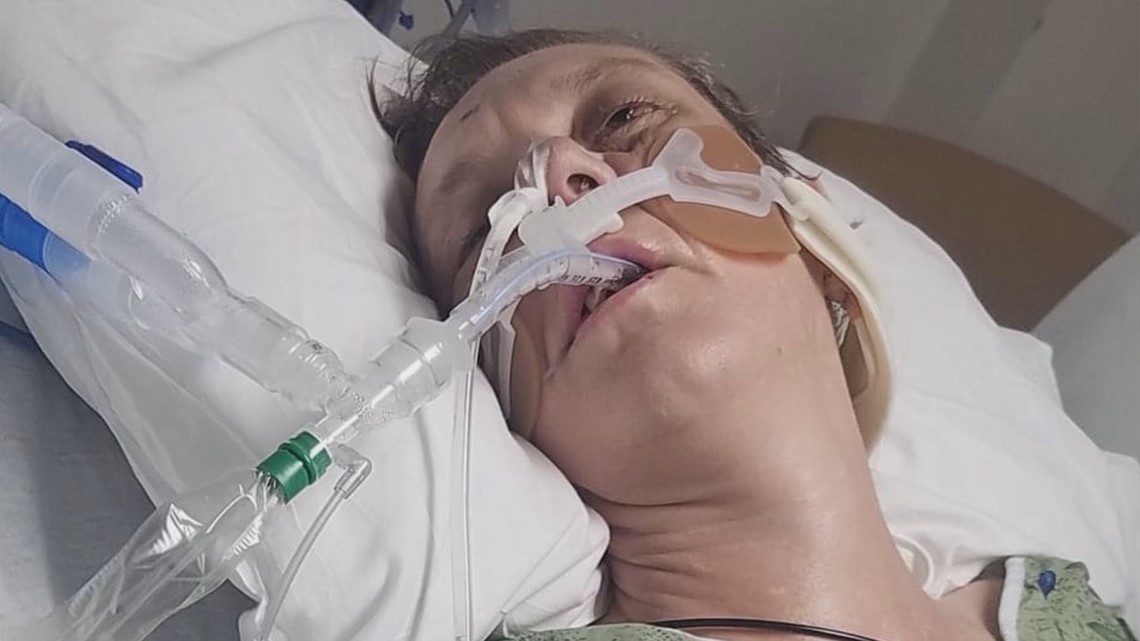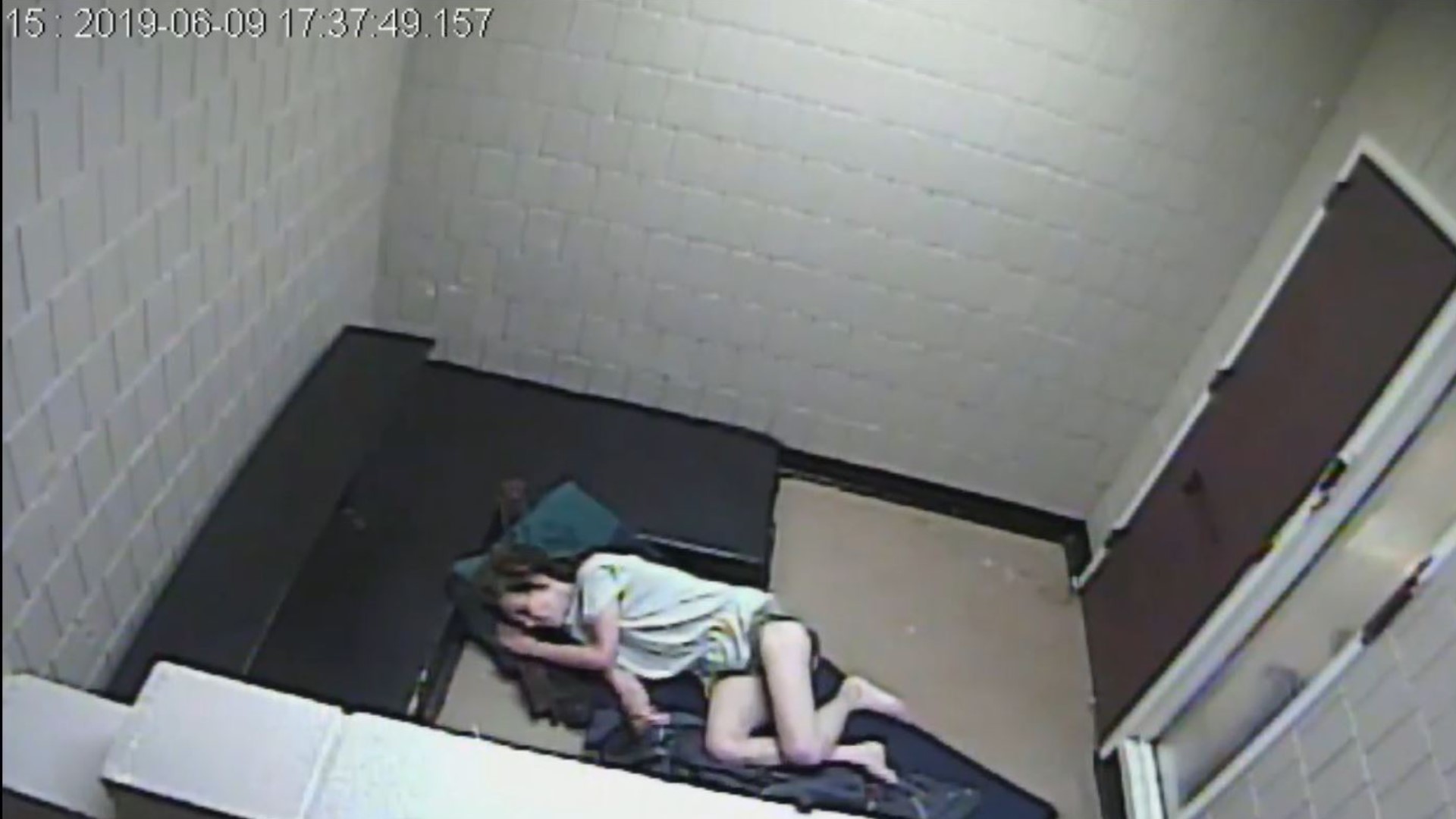DALLAS — In her final 48 hours in the Bowie County jail, Holly Austin appeared to be blind, unable to walk and crying out in pain, according to newly released videos obtained by WFAA as part of a federal lawsuit filed Wednesday by Austin’s family.
She can be seen crawling and blindly feeling her way around the cell. She appears unable to stand and able to crawl only with great difficulty, sometimes collapsing in apparent exhaustion. Austin is weak, thin and emaciated.


Throughout that 48 hours, the lawsuit says, jailers repeatedly log that they have conducted state-mandated jail checks when in fact they have not done so.
The lawsuit blames LaSalle Corrections, the private, for-profit that runs the jail, and Bowie County officials for her death.
“She was just the latest victim in a long line of victims of a corporate culture that puts profits over inmate's lives and sees inmates as dollar signs,” said the family’s attorney Erik Heipt. “If a prisoner of war was treated that way, it would be considered a war crime.”
LaSalle's spokesman Scott Sutterfield did not respond to a request for comment Wednesday.
For nearly two years, WFAA has been investigating the way LaSalle runs its county jails in Texas. Investigations repeatedly have shown that the for-profit company’s guards and staff failed to give appropriate medical treatment to people who get sick while locked up in their jails.
Because of our reporting, state lawmakers closed a loophole that allowed county jailers to be on the job for up to a year with virtually no training. Lawmakers also imposed new requirements on private companies operating county jails.


Our reporting showed that she was released from custody shortly before her death. As Austin lay near death, the sheriff suddenly ordered her released from custody. As a result, when Austin did die soon after, LaSalle was not required to report her death to state officials, nor was her death criminally investigated.
Austin's family, as well as jail watchdogs, say the loophole allows jails to hide cases of medical neglect and avoid accountability.
“The way they treated her was basically criminal,” said Holly’s husband, Mike Austin.
Austin said he has watched some of the video footage and he’s been enraged by what he saw.
“It was cruel the way they done her,” he said.
Probation violation
On April 5, 2019, Austin was booked into the Bi-state Jail. She had violated her probation on a misdemeanor.
Jail medical records show her blood pressure was normal and she was not experiencing headaches, nausea, vomiting, numbness or difficulty walking.
The records show the intake nurse faxed a request for information to Austin's medical provider to get information about her medical conditions and current medications. A response was not received until five weeks later.
On April 8, Holly’s husband brought her prescription medications to the jail.
One was a medication she needed for a life-threatening auto-immune condition. But records show that LaSalle’s medical staff did not give her that medication for several days.
Records show Austin filled out her first medical request April 13, reporting that she had a headache, was dizzy and had a knot on her neck. The next day, records show, Austin told a LaSalle nurse her head was hurting, had a swollen lump on her neck and could not move her left leg.
She was then put in a medical observation cell, records show.
Lab tests contained in the jail medical records show her white blood cell count was extremely low, indicating “that her immune system was severely compromised,” the lawsuit said.
Heipt told WFAA that the auto-immune disease she suffered from and her low white blood cell count made her uniquely susceptible to life-threatening infections, such as fungal meningitis.
As the weeks passed, Austin got sicker and sicker, her husband said. She continued to fill out medical requests, complaining that she was “unable to stand” and her legs hurt.
In early May, an outside mental health provider visited Austin, and reported she was very sick and had been passing out, according to the lawsuit. The lawsuit says LaSalle’s health services administrator told the provider that Austin was hypertensive and had been fainting, but that she also told the provider that Austin “pretends to be weak” and “knows how to play the sickly role.”
On May 13, LaSalle officials received the medical records from Austin's outside medical provider. Those records show she was “very immunocompromised.”
When her husband came to visit Austin in the days afterward, a LaSalle nurse helped her because she could not walk on her own. At one point, another inmate punched in the code to the phone because Austin couldn’t see the numbers, her husband said.
Mike Austin said his wife told him she thought jailers were messing up her medications. Her husband called the jail’s medical unit and tried to talk to them, but they would not discuss her condition with him.
Austin filled out her last medical request May 29. That same day, her husband again visited. This time she came to the visit in a wheelchair.
“She couldn’t walk on her own,” he said.
Later that day, he called Bowie County Sheriff James Prince, telling him he did not think his wife was receiving adequate medical care. He said Prince promised to fix the situation but didn’t.
The last time her husband saw her was June 1. She was brought into the visitation room in a wheelchair. It was a brief visit. She was sick and wanted to lay down, he said.
“She told me ‘Baby, when I get out of here, I’ll be able to get well and we’ll be happy,’” he said.
But when he tried to visit her on June 5, 2019, a jailer told him his wife was refusing to see him. Her mother, Mary Mathis, also went to the jail and was told that she was refusing to see her.
On June 6, the mental provider returned to the jail and was also told that Austin was refusing to meet with her as well, the lawsuit said.
'Refused to get up'
At 1:37 p.m. on June 7, 2019, a jailer entered Austin's medical observation cell and filmed a brief encounter on a handheld video camera.
Austin was laying on her side, holding her head with both hands. Her cell was littered with trash and debris. Her hair was matted. Her clothing appears dirty and stained.
The jailer asks, “Do you want to go see a doctor?”
Austin replies softly replies, “I don’t know. No.”
The jailer then says, “At this time, the offender has stated she does not want to go see the doctor.”
Twice, Austin then says, “They don’t never do nothing.”
The guard replies, “Okay” and leaves the cell.
A LaSalle nurse wrote in a progress note that Austin “refused to get up and come to medical.”
“Over time she lost the ability to walk altogether, could barely crawl and went completely blind,” Heipt said.
The next day, Austin's husband tried to visit her. He was again told that she was “refusing” to see him. On June 8, a LaSalle medical employee wrote she checked on Holly, noting, “0 needs voiced at this time” and “0 distress noted.”
Final 48 hours
Austin's family was able to obtain footage of her final 48 hours inside the Bowie County jail.
There is no audio, but the video depicts Austin's decline.
“There were often occasions where I had tears in my ears watching this woman suffer,” Heipt said.
On that first day, she can seen trying to get someone’s attention by yelling or banging on the wall or the window.
No LaSalle nurses responded and jailers routinely walked by without stopping or looking in, the lawsuit said.
At one point, she caught the attention of a jailer. He opened the food tray slot on her cell door and appeared to put a cup of water in the slot. She reached out in that direction, but appears unable to see it.
By then, the footage shows she had been in the cell for “almost nine hours with no food, no water and no medical care, treatment or evaluation,” according to the lawsuit.
At 6 p.m. June 9, a jailer opened the food tray slot and set a food carton and water in the slot. She appeared unable to find the food and water sitting in front of her – something that will happen repeatedly during the time she’s in the cell.
After about 12 hours in the cell, Austin drank her first cup of water. The footage shows a guard guiding it into her hand.
Throughout the night, LaSalle jailers walked by her window without stopping or looking into the cell, the lawsuit said. Heipt said several of them falsely logged on their mobile devices that they had conducted state-mandated visual checks.
Just after midnight on June 10, video shows a jailer opened the door and an inmate handed her the cup of water, guiding it into her hand. He covered his nose with his shirt as he backed out.
It was the second cup of water she’d had in 16 hours, according to the lawsuit.
Her condition continues to visibly deteriorate as the hours go by. The video shows that at times, she lay on the floor, clutching an empty water cup.
About 8:35 a.m. June 10, a LaSalle nurse came to the cell door. The nurse does not enter the cell. The nurse noted Austin was yelling, “water” and “give me some water.” She wrote she offered Austin water but she “refused(d) to take either,” according to the medical records.
Hours and hours will continue to go by without water. She can be seen laying on a urine-soaked mat.
When two inmates come into clean the cell, one of them held her hand and rubbed her head. The inmates replaced Austin's soiled mat with a new one, but she is not given fresh clothing, a shower or any food and water.
LaSalle’s medical records say she had been “exhibiting abnormal behavior throughout the day” and could be heard yelling, “I’m trapped in here. Let me out.”
Thirty-eight hours after Austin was first put in that medical observation cell, a video shows a nurse entered into the room and took her vitals. Records show it was the first time someone has taken her vitals in more than two weeks. Her heartrate and blood pressure were high, medical records show.
“Instead of getting this woman to a hospital immediately calling 911, she just left the cell and shut the door and wrote down some progress notes,” Heipt said.
On the morning of June 11, a guard entered the cell, accompanied by LaSalle Assistant Warden Robert Page, the lawsuit said. Austin was not moving and the footage showed the jailer putting his palm in front of his face and motioning up and down as if to say she’s blind, Heipt said.
A few hours later, a nurse and a jailer came into the cell with a wheelchair. They picked up her limp, emaciate body, place her in a wheelchair and took her to the infirmary.
LaSalle medical records said she was asking, “Where Am I? Why am I here? Water. Water.”
When she was handed a cup of water, she was so weak that she is “unable to grip” it, the medical records state. Her pupils were “nonreactive to light” and she had no “visible veins” for a blood draw, the records state.
An ambulance was summoned.
“In the 48 hours that she was in that cell, she had no more than three small paper cups of water and a few bites of food,” Heipt said. “She was visibly thin and emaciated.”
Hospital records show Austin was admitted to a Texarkana hospital in critical condition. She was blind and unable to sign her name, the records show.
Doctors would soon find she had meningitis and began treating her for it. Her condition never improved.
For four days, her family had no idea she was fighting for her life in a hospital bed.
On the morning of Saturday, June 15, Mike Austin again tried to see his wife. This time, he was told she wasn’t in the jail.
“I said, ‘Well, where is she?’” he said.
Jailers told him they could not say. Mike Austin reached out to Bowie County Sheriff James Prince, who said she had been in the hospital for days.
When the family finally did get to see her, she was unresponsive and could not speak.


A few hours later, a LaSalle official showed up asking the family to sign the patient’s name on release paperwork because she was too sick to write.
The paperwork shows Austin was being released for “medical reasons,” per the sheriff. She was formally released at 3:36 p.m. on June 15.
About 10 hours later, with her husband at her bedside, Holly Austin's heart stopped beating and she quit breathing. Doctors revived her and put her on a ventilator.
Tests showed that there was no blood flow to the brain which was “consistent with brain death,” hospital records show.
She was pronounced dead at 12:28 p.m. on June 17. She was 47.
Sepsis was listed on her death certificate as Austin’s primary cause of death, with meningitis listed as a secondary cause.
No criminal investigation
Because Holly Austin had been “released” from LaSalle’s custody shortly before she died, her death was not reported to the state, and no criminal investigation was conducted.
On June 28, 2019, WFAA reported Austin's death to the Texas Commission on Jail Standards, prompting state regulators to launch their own investigation. The commission is authorized to investigate whether state jail standards have been violated, but cannot conduct criminal investigations.
State jail regulators found that the medical care provided to Austin did not “meet minimum jail standards,” according to records obtained by WFAA.
Jay Eason, LaSalle’s director of operations, told the jail commission during a meeting last November that the jail’s nursing staffed failed to document that Austin's family brought her medication to the jail. He said that when Austin was moved to the jail annex, the medications did not follow her as they should have.
Eason told commissioners the facility’s nursing staff had been retrained, a medication verification form had been created and a new process started to ensure that medications follow an inmate when they are moved to a new facility. He also said that he planned to make it clear to the jail’s nursing staff that this is a “serious issue.”
Both Eason and Prince declined to answer WFAA’s questions after the meeting.
Austin's is just the latest death connected to the Bowie County jail.
In 2016, 20-year-old Morgan Angerbauer died of a severe lack of insulin on the floor of a cell. Jailers and a nurse ignored her as she screamed for help for hours. A nurse was convicted for her role in Angerbauer’s death.
A year earlier, Michael Sabbie, also a diabetic with asthma and heart problems, repeatedly told nurses he was having trouble breathing. Guards pepper-sprayed him as he screamed, "I can't breathe." Sabbie, 35, was found dead of a heart attack on his cell floor.
In March 2019, when Franklin Greathouse died of a seizure in the Bowie County jail, state investigators again found that LaSalle jailers failed to conduct face-to-face checks while at the same time falsely documenting that they had done so.
In other deaths at LaSalle’s jails in Waco and Weatherford, investigations have found jailers falsified records claiming that they had conducted state mandated jail checks.
Email: investigates@wfaa.com

